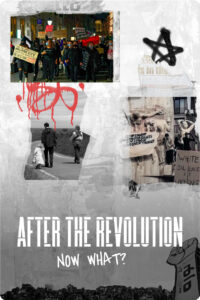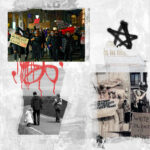December 2020 – Beirut
Click. The wheel of the lighter rolls under the thumb of Fadia Zahrour-Khadra. A cigarette is lit, maybe the tenth since I’ve arrived. Fadia’s face is welcoming but her right leg, crossed, shakes relentlessly. “I’m 57 years old. Never have I experienced this”, says in French this home hairdresser, sitting next to her mother on a purple sofa. “This time, we don’t have a war problem,” says with a smile the woman who has experienced the entire civil conflict (between 1975 and 1990) and its subsequent persistent instability. “But we have an economic crisis.”
“Usually I put up a Christmas tree here, with a crib.” Fadia points to the corner of the living room. “We used to buy presents. We would make a nice table.” This year, festivities won’t take place: the family of six is running out of money. A sorry smile appears on Fadia’s face.
“It’s after the explosion that it all became very difficult.” Located about a kilometer from the epicenter of the disaster, the apartment speaks for itself. Five months after the blast of two warehouses in the port of Beirut on August 4, fresh paint streaks are still visible on the walls. Windows are brand new: they’ve been replaced before the first cold waves by Offre-Joie, an active NGO in the neighborhood.
The entire neighborhood of La Quarantaine is a worksite: carpenters are based on the first floor and produce doors, frames and shutters on an assembly line.
The explosion topped off a year-long period of hardship, but the entanglement of crises is what has gradually clogged all the family’s horizon
A horizon clogged by crises
Just as 300,000 people in Lebanon, Fadia, her two daughters, her mother Hélène, her brother and her sister had to leave their home for a while, no longer inhabitable. Fadia’s thumb slides from left to right on the screen of her phone. Scrolls by the devastated room, the living room turned upside down, the kitchen where nothing works properly anymore. Then appears her daughter Michelle’s back, in which shattered fragments of a window got stuck. She escaped the worst. “A miracle.” Fadia speaks low. Her twenty year-old daughter has sat down away on the sofa, cross-legged with a tablet in one hand, a shisha in the other, and earphones in her ears.
The explosion topped off a year-long period of hardship, but the entanglement of crises is what has gradually clogged all the family’s horizon. “I’ve been working this year, but not as usual. It was too unpredictable,” says Fadia. For her, the hardships began with the revolution of October 17, 2019. After the announcement of a new tax on the messaging application WhatsApp, Lebanese people demanded that the political class step down from power*. Fadia took to the streets, convinced that “we can’t stand by doing nothing, the government is against the people, we have to change it.”
In reality, the anger manifested in the protest processions was closely linked to the economic difficulties that were felt. By summer 2019, several indicators of the Lebanese economy were blinking red already. For five years, the latter survived by means of a Ponzi pyramid**, organized by the governor of the central bank, Riad Salameh. The investors soon came to realize the swindle.
Without investors’ trust, the system brutally fell down upon the heads of Lebanese people. Starting from August, many of them wanted to transfer their savings abroad or withdraw them, for fear that they would go up in smoke in the bankruptcy of the entire banking system. Quickly, banks restrained withdrawals.
Lebanon defaulted on its debt in March 2020, a clear symptom of this deep crisis. A second crisis struck at that point: the coronavirus epidemic, which also brought the revolution to a halt.
Soaring prices
This successive series of events almost cost Fadia her job: “People don’t have any money left. And even if they do, it’s stuck in the bank…” she notes. Weekly appointments with her wealthy clients for a haircut or a blow dry have become scarce: in December, she can count them on the fingers of her hands, sometimes just on one. “Before the revolution, I earned 5 or 6 million Lebanese pounds per month,” that is between 3,300 and 4,000 dollars. A very comfortable income, about 7 to 8 times the Lebanese minimum wage. This month, Fadia struggled to pocket between 100,000 and 200,000 Lebanese pounds.
Not only has her income dropped, but her purchasing power has also fallen by hardly imaginable amounts. This is a second outcome of the financial fraud organized by the Lebanese central bank. In Lebanon, since 1997, two currencies coexist: the Lebanese pound and the U.S. dollar. Until 2019, they were used indifferently to manage daily expenses. But the monetary policy which was conducted by the central bank and the widespread loss of trust in the system caused the Lebanese currency to sink. In the past, a dollar could be bought with 1,505 pounds. In December 2020, it cost about 8,000 pounds.
Problem is Lebanon isn’t self-sufficient. The majority of everyday products are imported… and therefore bought in dollars abroad. The prices in Lebanese pounds have therefore rocketed. Between August 2019 and August 2020, the price of oils more than doubled, with an increase of 142%. Fruits go down the same road (+137%), according to the consulting firm Consultation and research institute.
At home, they all receive their salary in Lebanese pounds. “Before the crisis, my sister Joy earned the equivalent of 1,000 dollars.” Today, her salary is only worth 200.

“We’ve adapted… we’re really reducing the meat,” she sighs. Fadia pauses. “What can we do? That’s the way it is now. We have money for food, that’s enough for me. I’m hoping things will change.” Not everyone in Lebanon shares her acceptance or her timid optimism. As recently as in January 2021, several people set themselves on fire in Lebanon, in despair over their situation.
In this climate of uncertainty, the future of Fadia’s daughters lies, one thing is certain, outside the borders of Lebanon
Antipathy towards the government
The following Saturday morning, activities are confined to the great bazaar at Fadia’s place. The smell of cigarettes mingles with the sweeter smell of hookahs. In the middle of the living room, two nephews play backgammon. Farther on, a bunch of brothers, sisters and cousins gather in front of a magic slate, a Christmas present donated by a charity that very morning.
A very dense atmosphere on the purple sofa. The sisters line up. With an amazing degree of concentration, Hélène folds the family linen. Then she gets up and comes back from the kitchen with a steaming raqweh — an oriental coffee maker — in her hand. She pours the frothy coffee, Turkish style, into tiny cups.
The discussion turns to politics. Several voices speak up in French, English and Arabic, including that of Fadia’s sister, Joy: there’s only one solution left to bring Lebanon out of the impasse, the return of a French mandate! In this Maronite family, a Catholic community historically protected by France, many approve. This opinion may give rise to smiles, yet it is not that rare among Lebanese Christians. Fadia, for her part, doesn’t share the same opinion, even though she holds the government in contempt. “They are the ones responsible.” She refers to the case of her mother who receives no pension, as well as to the two hundred people who died in the explosion in the port of Beirut. It is also promises and commitments to change on the part of the government that the International Monetary Fund has been waiting for, for months, in order to intervene.
A future hanging by a thread
In a corner, Fadia’s youngest daughter Danielle, nineteen years old, seems more marked by the explosion on August 4 than by the economic situation, which she barely mentions. At the high school where she studies cooking, it is also a non-subject. “Most of the students are Shiite, so they receive help from Hezbollah and lack nothing,” she says.
As for her mother, she can afford to pay for her studies for now: 600,000 Lebanese pounds per year, that was 400 dollars before the crisis and equates 75 now. She pays a little less for Michelle’s translation studies at the Lebanese University. Fortunately, these fees are nothing like those of the country’s most prestigious, private and very expensive universities. Some of them, such as the American University of Beirut, announced in December that they would change the exchange rate that is used to calculate tuition fees. As a result, for students paying in Lebanese pounds, fees almost tripled from one day to the next.
Help us tell the world to you !
Frictions is launching its club : by supporting Frictions, you’ll be supporting a community of authors and journalists who tell the world through intimate stories!

They are not the only ones who fear that they will not be able to continue their studies: likewise, parents of younger students are deeply concerned. This is the case of Grace, Fadia’s sister, who sends her three children to the French Protestant College, a school that costs 3,500 dollars a year. “Before school break, the school wouldn’t give me my son’s report because I haven’t paid all the school fees,” she worries. Her arrangement with the school is now hanging by a thread.
Because she used to work for the school in the past, she benefits from a special rate for her three children. A sum of money that she is nevertheless obliged to loan, because she doesn’t work and her husband is only part-time employed: in Lebanon, due to the successive crises, 30% of the active population is unemployed today.
A year ago, the school administration tried to put an end to this discount rate. Grace won the battle at last. But for how long? What about next year? Her children’s future is “in God’s hands,” she answers.
In this climate of uncertainty, the future of Fadia’s daughters lies, one thing is certain, outside the borders of Lebanon. Barely in their twenties, both have a destination in mind: Canada for Michelle, Spain for Danielle. They will join the diaspora which is growing rapidly since the blast of the port.
* For further explanations about the Lebanese revolution of October 2019 and the explosion of the port in August 2020, read Lebanon: From Spark to Implosion published in October 2020.
** This system of financial fraud consists in paying investors with the money invested by newcomers. In Lebanon, banks proactively attracted investors who used U.S. dollars. Investors subscribed to certificates of deposits at the Lebanese central bank. This investment guaranteed them very high interest rates (up to 30%) in the short term. But afterwards they would collect their earnings in Lebanese pounds. As a result, the central bank was supplied with fresh new dollars. Investors could then change their Lebanese pounds into dollars and take the money out of Lebanon.
Special thanks to Sami Zughaib for his economic explanations.
© photo : L. Delacloche









